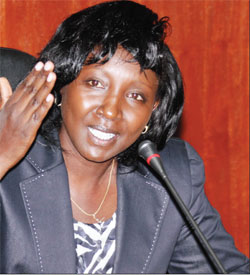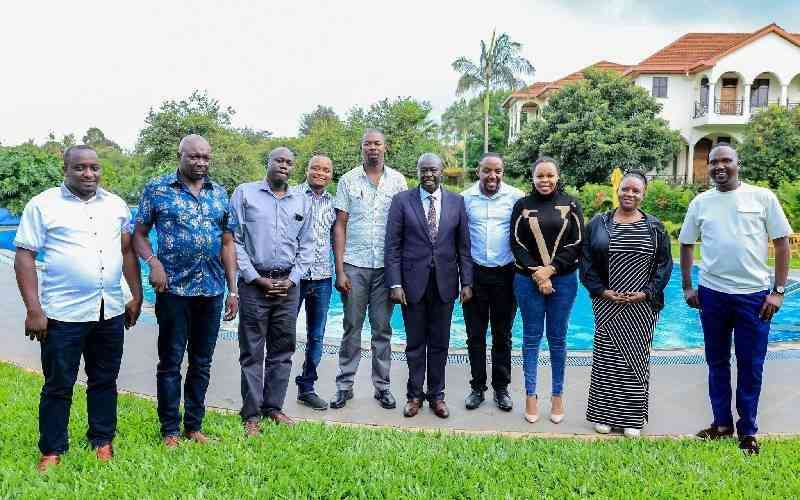By David Ochami
A judge who has applied to be deputy Chief Justice says she is overworked and her life has "come to a standstill" since she was appointed to the Bench.
 |
Meru High Court Judge Mary Kasango Wednesday, when she was interviewed by the Judicial Service Commission for the position of deputy Chief Justice. [PHOTO: ANDREW KILONZI/STANDARD]
|
She, however, blamed this on a huge workload when the Judicial Service Commission (JSC) questioned her suitability for the Supreme Court, ability to comprehend and fight corruption in the Judiciary and rationale behind one of her past judgements.
"There is need to allow judges time to read… they are pounded with work," Justice Mary Kasango said Wednesday as she tried to explain judges’ shortcomings.
"My life came to a standstill when I joined the Bench," she added, claiming because of too much work "I have no time for my family. I have become anti-social."
She said many judicial officers were on the brink of falling sick with high blood pressure from fatigue.
And the judge, who is based in Meru, admitted she had no clear understanding of the nature and scope of corruption in the High Court and Court of Appeal, but blamed this on lack of contact with litigants.
When pressed to discuss corruption in the two courts, she first suggested reports of the crime were often instigated by embittered losers in court then quipped: "It has never come to my attention that there is corruption in the two courts.
She later suggested that she could be naÔve in her assessment, with JSC Commissioner Ahmednasir Abdillahi questioning her capacity to deal with a crime she has no knowledge of if promoted to the post of deputy CJ.
Where do you live?
Eventually, Justice Kasango said she had heard of corruption in the said places "as rumours" and concluded that "at this moment I would be lying if I said I am aware" of the extent of graft in the two courts.
The stark admission forced Ahmednassir to ask her: "Where do you live?"
Attorney General Amos Wako, who sits in the JSC, told Kasango she could be dissolving herself in legal work and "you may not be aware what is happening around you."
She admitted yesterday that the ruling in which she rendered judgement using the new Constitution from submissions and proceedings conducted under the old charter was a mistake, committed out of ignorance of a Court of Appeal ruling outlawing such rulings.
Stay informed. Subscribe to our newsletter
Questioned by JSC Commissioner Florence Mwangangi why she rendered the ruling notwithstanding the Court of Appeal decision, she said: "I did not know (about the Court of Appeal ruling). We have law reporting and I was not aware of that decision and I made that decision the best way I could."
She admitted that many undeserving lawyers joined the Bench before the promulgation of the new Constitution, but described herself as an intellectual with the depth that can enlighten a reformed Judiciary.
Kasango, who attended secondary school and university in England admitted she did not study constitutional law at bachelor’s level but stridently denied being a recluse.
She said: "Do I close myself? No, I do not close myself in."
 The Standard Group Plc is a
multi-media organization with investments in media platforms spanning newspaper
print operations, television, radio broadcasting, digital and online services. The
Standard Group is recognized as a leading multi-media house in Kenya with a key
influence in matters of national and international interest.
The Standard Group Plc is a
multi-media organization with investments in media platforms spanning newspaper
print operations, television, radio broadcasting, digital and online services. The
Standard Group is recognized as a leading multi-media house in Kenya with a key
influence in matters of national and international interest.
 The Standard Group Plc is a
multi-media organization with investments in media platforms spanning newspaper
print operations, television, radio broadcasting, digital and online services. The
Standard Group is recognized as a leading multi-media house in Kenya with a key
influence in matters of national and international interest.
The Standard Group Plc is a
multi-media organization with investments in media platforms spanning newspaper
print operations, television, radio broadcasting, digital and online services. The
Standard Group is recognized as a leading multi-media house in Kenya with a key
influence in matters of national and international interest.







